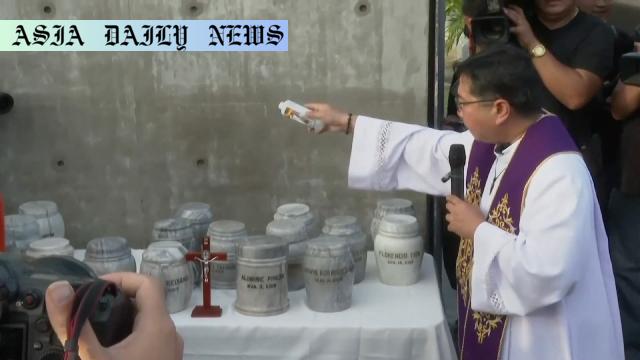Duterte trial: Families mourn victims of the ‘war on drugs’ as Duterte faces ICC charges for crimes against humanity.

Introduction to Duterte’s ICC Trial
In a groundbreaking development, former Philippine President Rodrigo Duterte has been taken into custody by the International Criminal Court (ICC) in The Hague. He faces charges of crimes against humanity stemming from his controversial ‘war on drugs.’ Duterte’s leadership, though widely recognized for its aggressive anti-drug campaign, has been heavily scrutinized due to the staggering number of extrajudicial killings. Now, as the ICC begins its legal proceedings, the voices of grieving families echo louder than ever, demanding justice and acknowledgment of their pain.
The ‘War on Drugs’: A Dark Chapter
During his six-year presidency from 2016, Duterte enacted a campaign centered on eliminating illegal drugs in the Philippines. However, researchers, human rights groups, and lawmakers have heavily criticized the program for its indiscriminate methods. According to the Philippine government, over 6,000 individuals perished. Nevertheless, Congress and other independent reports estimate that the true figure surpasses 30,000—a mix of drug users, low-level sellers, and innocent individuals caught in crossfires. Such statistics stand as chilling reminders of widespread violence cloaked under the banner of justice.
Anguish of Victims’ Families
On a somber Wednesday in Manila, grieving families attended a ceremony commemorating their lost loved ones. Many laid the remains of the deceased to rest, sharing heart-wrenching stories of those who fell victim to Duterte’s sweeping campaign. One grieving mother, Melinda Lafuente, openly criticized the former leader, urging him to admit responsibility for the killings. Her emotional appeal highlighted the human cost of Duterte’s policies. These ceremonies not only serve as a form of collective grieving but also as platforms for advocacy for justice and accountability.
Political Repercussions at Home
Duterte’s detention has created waves in the Philippines’ political landscape. His daughter, Vice President Sara Duterte, has publicly condemned the arrest, voicing strong disapproval of the Marcos administration’s compliance with the ICC warrant. Reports suggest that she has traveled to the Netherlands to meet her father. This familial and political tension underscores a nation divided on how to address Duterte’s legacy. For some, his policies symbolize unwavering leadership, while for many others, they represent unchecked authoritarianism.
The Path Forward
The ICC trial of Rodrigo Duterte represents more than the prosecution of a single leader—it symbolizes global accountability for human rights violations. As the legal proceedings unfold, it will reveal the international community’s stance against such acts. For the families of victims, this trial offers hope for justice, albeit delayed. It also compels a reevaluation of national policies that heavily rely on force rather than reform. Moving forward, the Philippine government must reckon with its past and construct policies aiming for restorative justice, reconciliation, and humane governance.
Conclusion
Rodrigo Duterte’s trial is a defining moment, not only for the Philippines but also for the international community. It underscores the collective responsibility of nations to hold leaders accountable for crimes against humanity. It also sheds light on the importance of political advocacy, human rights stewardship, and justice for victims of state-sponsored violence. While the road to justice may be long and arduous, this trial is a critical first step in addressing a tragic and dark chapter in Philippine history.
Commentary
Analyzing the Gravity of Duterte’s ICC Trial
Rodrigo Duterte’s arrest and impending trial at the International Criminal Court in The Hague has sparked global attention. This development offers a significant moment to evaluate the accountability of leaders accused of human rights violations. For years, Duterte’s ‘war on drugs’ polarized the Philippine population and garnered international criticism. Supporters justified it as a crucial anti-drug campaign, while critics condemned it for its brutality and disregard for due process. His trial symbolizes a chance to officially dissect the legality and morality of such policies on a global stage.
The Impact on Philippine Society
For many Filipinos, this trial is deeply personal. Families who lost loved ones during the anti-drug operation are hopeful that this is the first step toward justice. For far too long, the lives of innocent individuals were subsumed under a campaign marked more by violence than reform. The mass ceremonies held in homage to these victims are not just acts of grieving; they are acts of protest and resilience against authoritarian governance. Yet, Duterte’s arrest also leaves behind a divisive legacy. His daughter’s defense and condemnation of the Marcos administration reveal that this issue extends far beyond human rights—it deeply impacts family and political alliances.
Global Implications of the Case
The international community watches closely as the ICC initiates proceedings against Duterte. This case serves as a powerful reminder of the importance of international efforts to combat impunity. However, it also exposes the challenges inherent in holding high-ranking officials accountable. The ICC’s ability to carry this case to its conclusion will set a precedent for future allegations of state-sponsored violence and human rights abuses. Countries must recognize this as a signal to uphold justice within their borders, thus avoiding international intervention.


